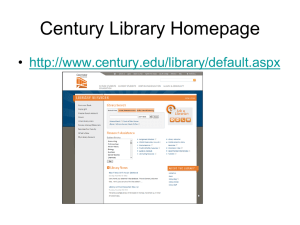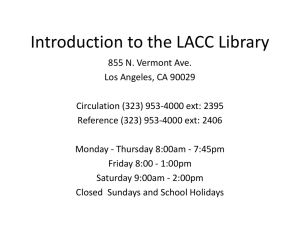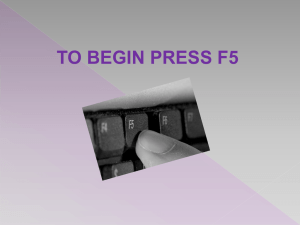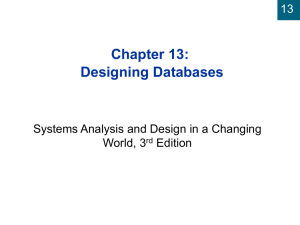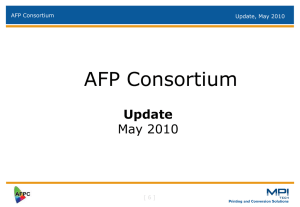Presentation
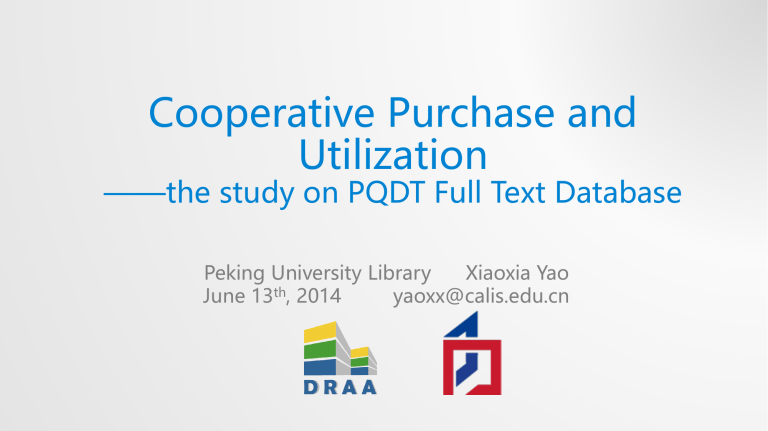
Cooperative Purchase and
Utilization
——the study on PQDT Full Text Database
Peking University Library Xiaoxia Yao
June 13 th , 2014 yaoxx@calis.edu.cn
Contents
1
2
3
DRAA Introduction
PQDT database Purchasing
The effectiveness of the consortium
1
DRAA Introduction
About DRAA
DRAA: Digital Resource Acquisition Alliance of Chinese Academic
Libraries
Purpose
Cooperative purchasing
Standardize and guide purchasing activities
minimize spending while obtaining resources with the best prices and services guide coop erate
Best price purchasing libraries gather together acting as a consortia to purchase or import foreign databases as a whole
DRAA Council
DRAA council
Formulate the development strategies and guide the implementation of DRAA
Chairman:Director of PKU library
Member: 33 librarians from 29 institutions
DRAA Secretariat
Business management :DRAA Portal, DRAA
Proposal, DRAA training
Located in PKU library
Related Parties
Organizers of Consortia
Publishers
Agencies
Members
Organizers of Consortia
Negotiate with publishers,
Organize members to take part in database purchasing consortia
There are ten organizers in DRAA:
•
Peking university library and Tsinghua university library organize most of the consortia, each of them organized more than 30 consortia in 2013
•
Peking university medical library, China agriculture university and Shanghai JiaoTong university, each of them organized more than 10 consortia
Publishers
7
8
5
6
9
10
No.
1
2
3
4
16
17
18
19
20
11
12
13
14
15
Publishers
ASTM
Begell House
China InfoBank
CINFO
Emerald iGroup
Sage
Taylor & Francis
Thomson Legal & Regulatory
AiQinHair Company
Beijing Zhong Ke I/E Company
The Charlesworth Group
Springer
High Education Press
Dialog
Elsevier
SWETS
OCLC
Cengage Learning Gale
EBSCO
25
26
27
28
29
30
No.
21
22
23
24
36
37
38
39
31
32
33
34
35
Publishers
EI
Encyclopaedia Britannica
ISI
John Wiley
JSTOR
LexisNexis
Ovid Technologies
ProQuest
Thomson Reuters
OUP
Karger
TanWan Academic Online
Flysheet
Asia Pacific medical Information company
Nature
IET
RSC
CUP
IOP
Agencies
Authenticated by DRAA
Imported and exported companies
Contents Auditing
Paying to publishers on behalf of libraries
Help publishers do some training job
DRAA Members
Up to June 1 st ,2014,
561 members,
1701 register users
cooperatively purchased databases from 1997 to 2013
type e-journals e-books
Full-text databases
Factual databases
A&I databases
Others
总计
Database number
44
Participant libraries
3278
12 153
18
22
28
8
1294
537
1481
312
132 7055
A & I databases, 28 factual databases, 22 others, 8 full textt databases, 18 e-jouranls, 44 e-books, 12
Statistic on the types of purchased databases in 2013
90,00%
80,00%
70,00%
60,00%
50,00%
40,00%
30,00%
20,00%
10,00%
0,00%
DRAA
84.92%
Regional consortia
66.83%
Buy through themselves
73.81%
Resource sharing
41.59%
The ways of database purchasing donation
17.46%
Free Access
48.89%
Others
7.62%
The preferred way of database subscription: DRAA
100,00
95,00
90,00
85,00
80,00
75,00
70,00
65,00
60,00
55,00
50,00
64,73
05 年
69,11
06 年
72,46
07 年
69,34
68,46
08 年 09 年
70,64
69,00 68,79
69,78
70,12
10 年 11 年 12 年 13 年 14 年
Users’feedback to DRAA
Members’opinion to DRAA
has provided professional negotiation that demonstrates the power of academic libraries in China
has provided rich sources of information for teaching & research in
China, and has accelerated the use of foreign information resources
has built a normative platform of cooperative purchasing for national academic libraries, and has also promoted the process of importing foreign databases
has narrowed the gap between small libraries and big ones, greatly improving the quality of imported foreign databases
has decreased costs and protected the interests of CALIS members
DRAA Portal
Integrated multifunctional platform
Database
Cooperate
• DRAA: mange and evaluate consortia
• Organizers: release the information on database purchasing
• members: online database trail and purchasing
• Publisher: buying database
Wikipedia
Management
Usage statistics
Evaluation
Center
Training
Center http://www.libconsortia.edu.cn
2
Purchasing on PQDT
Full-text Database
Introduction on PQDT database
The world's most comprehensive collection of dissertations and theses
3 million searchable citations to dissertations and theses
1 million full-text dissertations that are available for download in PDF format
More than 80,000 new full-text dissertations and theses are added to the database each year
Subject distribution of full-text database
Applied Sciences(162781)
Social Sciences(98107)
Pure Sciences(77559)
Earth and Environmental
Sciences(30178)
Communications and the
Arts(26437)
Psychology(23639)
Biological Sciences(72864) Language, Literature, and
Linguistics(23172)
Education(41993)
Philosophy, Religion, and
Theology(11601)
Health Sciences(36401)
By July 16 th , 2014 , Total number of PQDT full-text is 466,452
Taking Part in the consortium
Firstly, the institution should fill in a receipt and upload it to the DRAA portal
Then, every participated member has to sign a purchasing agreement with ZhongKe I/E company(the agency of PQDT full-text database in China)
After the payment, members can choose and submit dissertation and thesis orders to subscription system
If the valid orders submitted by members did not reach the fixed number, the insufficient number will be selected and submitted by CALIS.
Lastly, the whole full-text orders will be uploaded to
CALIS and other two servers in China to be visited
Utilization Model
"Unlimited cross access"
Each end user can visit collections bought by their institutions and other participants
It offers participants the right of permanent access to the full-texts bought by the consortium
"cost savings”
Each participant chooses a different collection and gathers them together to make the consortium having the most collections to be visited. CALIS is to make sure the
Uniqueness of the record
The consortium avoids the duplication of abundant collections and generates significant cost savings on holding selection
Long-term storage & permanent access
Members will continue to have the right to visit the resources of the consortium they have participated whatever they join the next year’s purchasing activity or not
Whether a member joins the consortium later or exits earlier, this member will obtain the rights of long-term storage and permanent access of the full-texts they ordered
CALIS provides long-term storage and permanent access service to PQDT full-text database consortium
As long as one purchased a fixed number of dissertations and theses according to some deals and shared with others, it is allowed to visit the resources subscribed by old members
Retrieval system
Developed by ZhongKe I/E company
The servers are deployed in three places
Subscription system
Participants work together to protect the entire consortium without repeating orders and avoid duplicated holdings for participated libraries
3
The effectiveness of the consortium
More libraries join the resource sharing activities
The full-texts keep increasing
The usage on PQDT database
The contribution of CALIS
provides the guideline on the development of PQDT full-text database
prompts libraries' investment on the resources of dissertation and thesis
offered subsidies to participant member in CALIS phase one and phase two development
organize the subscription, conduct the negotiations
protect the interests of consortium members
evaluate the database on contents, platform, usage statistic, publishers' service
Cooperatively hold training to promote the consortium development, to train staff skills on database usage
Further consideration
order dissertations and theses anytime and anywhere
discuss other solutions, such as the way of interlibrary loan, document delivery, Pay per View (PPV) and so on
promote the model on "unlimited cross access” and
"cost savings”to other databases
provide different kinds of resource sharing models on cooperative purchasing under the support of publishers and agencies
